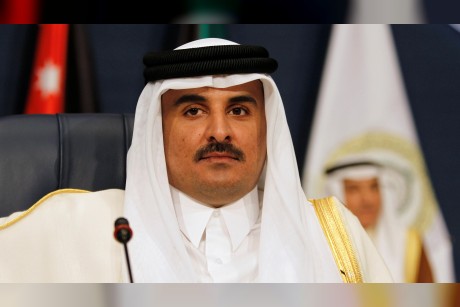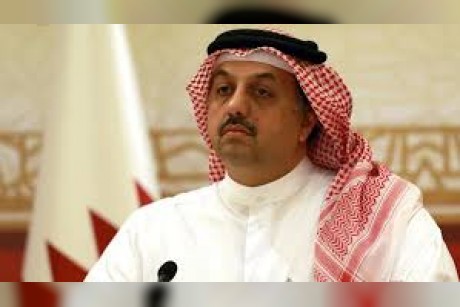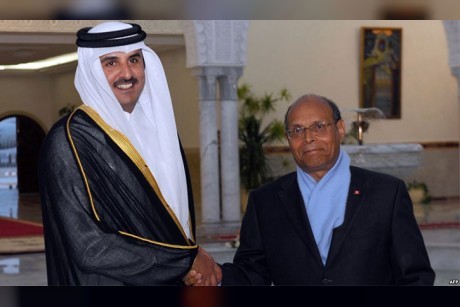After the four countries, Saudi Arabia, the United Arab Emirates, Bahrain and Egypt, cut ties with Doha, two parties that have nothing to do with each other rushed to defend Qatar. The first one is a group of the most famous terrorists, some of whom are in battlefields, and the other is a group of the most famous football players. Abdullah al-Muhaysini, a terrorist in Al-Nusra Front which branched from al-Qaeda organization condemned boycotting Qatar and called for ending the boycott via a video recording from Syria. Similarly, Xavi, who previously played for Barcelona, made the same demand.
It’s a strange paradox. So what does a terrorist have in common with a famous footballer?
The answer is the deception which Doha has practiced for years while showing a civilized and cultured face to the West and a dark and an extremist face to the East. Commenting on Qatar’s intentional double standards at the European Parliament few days ago, Saudi Foreign Minister Adel al-Jubeir addressed the West and told them they do not know Qatar’s dark side and only see it as a country with museums and the Paris Saint Germain football club.
Two faces and double standards
Due to this huge contradiction, many westerners find it difficult to believe that this small state which promotes itself as a center for arts, education and sports is hosting terrorists (Muhaysini, who is wanted by Saudi Arabia, lived in Doha for years) and extremists whose fatwas (religious edicts) and ideas poisoned people’s minds. An example of these extremists is Yusuf al-Qaradawi who issued a fatwa permitting suicide operations. Photos of Qatari officials with football teams’ and associations’ officials making headlines across the world make people forget that the mastermind of the September 11, 2001 attacks Khalid Sheikh Mohammed lived in Doha until 1995 and disappeared after the US authorities demanded his arrest.
This information was not disclosed by the four boycotting countries but by Richard Alan Clarke, the National Coordinator for Security, Infrastructure Protection and Counter-terrorism during the terms of Bill Clinton and George W. Bush. Clarke narrated details on the matter in a report published by the Daily News. Few westerners read the Abbottabad Documents, which were recovered from Bin Laden’s hideout. The documents included letters in which Bin Laden talked about al-Qaeda member’s links and ties with Tehran and Doha which he advised his son Hamza to move to. Colleague Huda al-Saleh published extensive reports on these documents in Al Arabiya.net. (We must not forget that Al-Jazeera television channel broadcast videos from Osama bin Laden that called for killing infidels and then hosted commentators who were introduced as clerics.)
Due to these double standards, some journalists are incapable of believing the aforementioned details or they deny it and thus make false and inaccurate comparisons. Accusations that Qatar funds terrorism are not new but they were made a long time ago – even before the anti-terror quartet boycotted Doha – by western officials. In 2015, the US Treasury said Qatar was involved and lenient in terms of funding terrorist groups. There’s a long list of accusations made by official sources who have documents supported with evidence and that are not under the influence of Doha’s fake civilized face.
The list is actually long. The most prominent example is how Qatar paid $1 billion to Sunni and Shiite terrorists and Iranian officials to release a number of Qatar’s royal family members.
Commenting on these documents, some writers responded by making false arguments and stating that Qatar supports terrorism and so does Saudi Arabia. A New York Times piece claimed that without providing any tangible evidence.
Truth be told, the rhetoric of extremism reigned in Saudi Arabia for a long time and controlled social and educational institutions. The Saudi government has been frank in the past few years when it announced this was a huge problem. Saudi Crown Prince Mohammed bin Salman thus made his famous statement: “We will destroy extremists today and immediately.” He cited the kingdom’s actions in this regard as there have been major changes there in a short period of time.
There have been real changes in Saudi Arabia and not fake ones like Qatar has done. Saudi Arabia granted women more rights and the rhetoric of extremism was restrained and it thus became difficult for extremists, who once controlled the public space, to write sectarian Twitter posts that incite hatred as they now fear being held accountable.
Boycotting Qatar played a decisive role because it cut oxygen off extremists whom it supported to incite people in Saudi Arabia, the UAE and other countries. It’s interesting how some extremist preachers who previously incited the public opinion over the simplest modernization measures kept silent and even turned their social media accounts into pages to advertise cooking pots and grills!
Doha, which pretends before westerners that it embraces enlightening ideas, did not like this positive social and intellectual Saudi transformation towards moderation. Its media outlets launched a violent attack against the Saudi government just because women were allowed to attend football games and described the Saudi move as a manifestation of dissolution.
Why does Doha have these two contradictory images? The answer is easy. Doha wants to use terrorist and extremist groups and to rise on their shoulders to reach power. This is why it supported and still supports the terrorist Muslim Brotherhood across the world. At the same time, Doha uses universities and football stars to add a cultural touch, civil glamor and a good international reputation to its image and thus picture itself as the small prosperous country that’s capable of turning the dark East into an advanced arena.
This fake image is deceptive. It is as dangerous on the West as it is on the four boycotting countries which realized that Qatar’s continuous support to terror and extremist groups will not bring stability to the region and will prolong the duration of war on terrorism which Doha keeps nurturing by embracing its intellectual preachers and armed men. The biggest threat is against the US and Europe because terrorism knows no borders and is not exclusive to one nationality. We all remember the horrific terror attacks that happened in Paris, New York and London.
The message is clear as without forcing Doha to implement the conditions of the boycotting countries and completely preventing it from supporting terrorism and extremist groups which promote hate speech around the clock, we will witness more horrific terror attacks because the heart of intellectual and financial terrorism continues to beat. We must not be fooled by the two-faced Qatar and its double standards. There is only one ugly face. Neymar is a mere mask on Qaradawi’s face.



